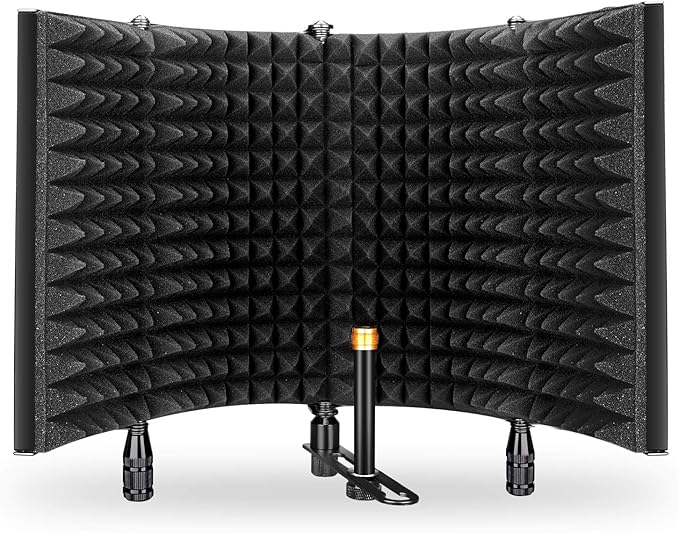How Important Is A Vocal Recording Booth?
by Voclio

With the number bedroom producers and recording artists at an all-time high, many might wonder...do I need to get my vocal takes done at a studio? Do I need a vocal recording booth?
In this article, we’ll give you the rundown on whether or not recording vocals in a booth makes a difference. As well as the top alternatives and tools you can use to get crisp, clear vocal recordings!
What Is a Vocal Recording Booth?
A vocal recording booth is a booth designed to provide the ideal vocal recording environment. This is achieved by isolating any outside noise from entering the booth, as well as controllingp the sounds and vibrations within the booth.
The two biggest things that a vocal booth offers is:
1. Keeping any outside noise from getting into the booth.
This can be anything from street noise to a computer fan. These types of noises, if captured by the microphone, will lead to a poor-quality recording that can be more difficult to edit.
2. Creating an ideal sound environment for singing.
An ideal sound environment for singing is one that does not produce any echo. When you sing, sound waves travel through the air and bounce off the walls. The more prone a room is to echo, the worse your vocal will sound.
This is why most vocal booths are completely padded with noise dampening foam pads or different types of cloth material.
So now that we know what a vocal booth is...
Do I Need A Vocal Booth?
To us, our opinion is no. But this answer may also depend on your standards. A vocal booth will ensure your vocals are 100% perfect and clean. But if you're ok with 92% perfect, then you can use some cheap hacks to get quality recordings. Here are the primary two reasons why we think you don't need one:
1. Vocal editing software Is 1000x better than it use to be
Production tools have come a long way in the last 10-20 years. Many years ago, if you were to have any sort of noise in the background of your vocal, your options to clean up the track were pretty limited.
These days there are plenty of vocal editing plugins that are crazy powerful. The Vocal Cleaner plugin will remove any harsh frequencies along with small artifacts found in the recording.
There are tons of vocal editing plugins that will remove harsh sounds, background noise, and more.
2. There are many alternatives and recording setups that offer good sound dampening
This piece is probably more important. Unless you live in a place where you just can't find a reasonably quiet spot, then you can typically use a few workaround hacks to achieve sound booth quality vocals.
Best Alternatives to A Vocal Booth
If recording vocals at home, then here are the best ways to achieve a vocal booth quality recording.
1. Record in your most "clothed" room
The best place to record vocals is typically a bedroom because it often has many noise-dampening pieces of furniture. Things like a mattress, pillow, sheets, a rug, clothes on the floor, will all act as noise dampeners! This is the first time in your life where your clothes thrown all over your room will be a good thing!
If your house is quiet and you have a naturally padded room, then you can typically achieve a great recording without a booth. Just make sure to have a good mic!
The absolute worst place to record is a large open room with hardwood or tile floors. Kitchens, dining rooms, and living rooms often are the worst places to record.
2. Buy an isolation shield
A vocal isolation shield will go a long way and is relatively inexpensive.
The Aokeo Isolation Shield in less than $40 and works great for setups where your mic is on your desk.

The CODN Studio Recording Microphone Isolation Shield is best for standing setups and includes a stand along with a pop filter:

3. Foam pad your closet
When you think about it, a closet isn't all that different than a sound booth. If you have a decent-sized closet, then you can easily create a DIY vocal booth.
Ideally, you'll want to take at least a portion of your clothes out so that you can fully stand inside the closet and slide the door shut.
You can then cover your closet walls with foam sound isolation pads.
These ones from amazon come in a 48 pack and cost just $39.

So does a vocal booth make a difference?
Long story short, a soundproof booth for vocals certainly helps! But there are many alternative solutions that will help you achieve clean recordings.
If your home is full of hardwood floors with limited padded furniture, then you might have a tougher time and have to do a bit of DIY'ing. But ultimately, if you're smart about your recording setup, there is no reason why the lack of a studio should prevent you from creating some great sounding vocal tracks!
We hope that these tips can help you maximize your success as a vocalist. If you have any tips that you’d like to share feel free to get in touch with us on social! @VoclioOfficial. Or drop us an email at contact@voclio.com